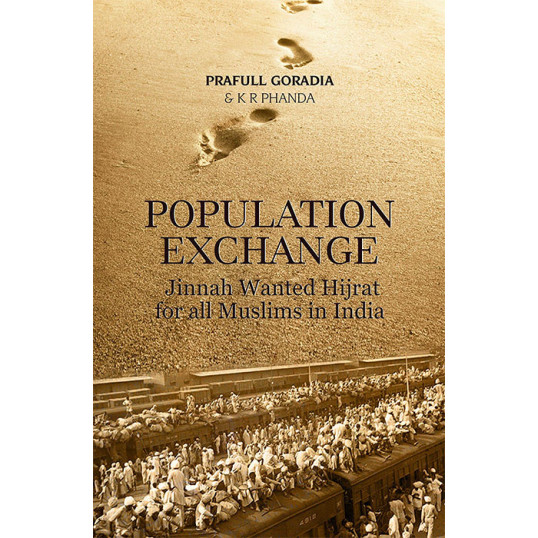Population Exchange: Jinnah Wanted Hijrat for Muslims in India
- Brand:Vitasta Publishing Private Limited
- Product Code: KB-202
-
₹476.00
| Book Details | |
| Author | Prafull Goradia |
| Publisher | Vitasta Publishing Private Limited |
| Language | English |
| Publication Year | 2020 |
| ISBN | 9789386473813 |
| Edition | 1st |
| Binding Style | HardCover |
| Number of pages | 276 |
| Weight | 350 g |
| Shipping Time | 2-4 Working Days |
| Delivery Time | 4-10 Working Days (Through India Post) |
| International Shipping | Yes (Through India Post) (International Shipping Charges applicable) |
Population Exchange: Jinnah Wanted Hijrat for all Muslims in India looks into the rationale of the Muslim League’s proposal of a population transfer in the context of the Partition of India. The justification lay in the argument of how different Hindus were from Muslims, and therefore, how indispensable a vivisection was for them to live in peace. The ‘best protection for the minorities will be the establishment of two strong states, neither of which will dare misbehave towards each other’s minorities’. Jinnah adamantly asserted: ‘That is the only solution if you don’t want civil war’. Partition was to provide India’s Muslims a homeland. Some called it a New Medina, others a Dar-ul-Islam. It was a premediated move on religious lines. There was no other reason for Partition. Ironically, Jinnah’s proposal of an exchange of population fell on the deaf ears of Indian, read Hindu, Congress leaders and it resulted in an exodus – what happened in West Punjab was not a riot nor a mere pogrom, but a holocaust of Hindus and Sikhs, causing a flood of refugees to cross into India. A similar tragedy unfolded in the eastern wing of Pakistan. In comparison, the exodus of Muslims out of India was nominal. The author points out, had there been a population exchange as in Greece and Turkey, India would not today constantly face threats of communal discords and wars with Pakistan.
About the Author
Prafull Goradia, a former parliamentarian, enjoys writing and has authored several books. They include Dear Editor (1997), Saffron Book (2001) and Hindu Masjids (2002), a painstakingly researched work on how Hindu mandirs have been converted into masjids, predominantly in the pre-Lodi period. Krishna Rajya, which can be called India’s second book on political science after Kautilya’s Arthashastra, which sheds light on an hitherto unexplored aspect of India’s political life and Saffron Awakening (2017) are some of his major works.
Tags: Non-fiction, Jinnah, Hijrat, partition of India, population exchange, South Asian history, political history, Muslim migration

